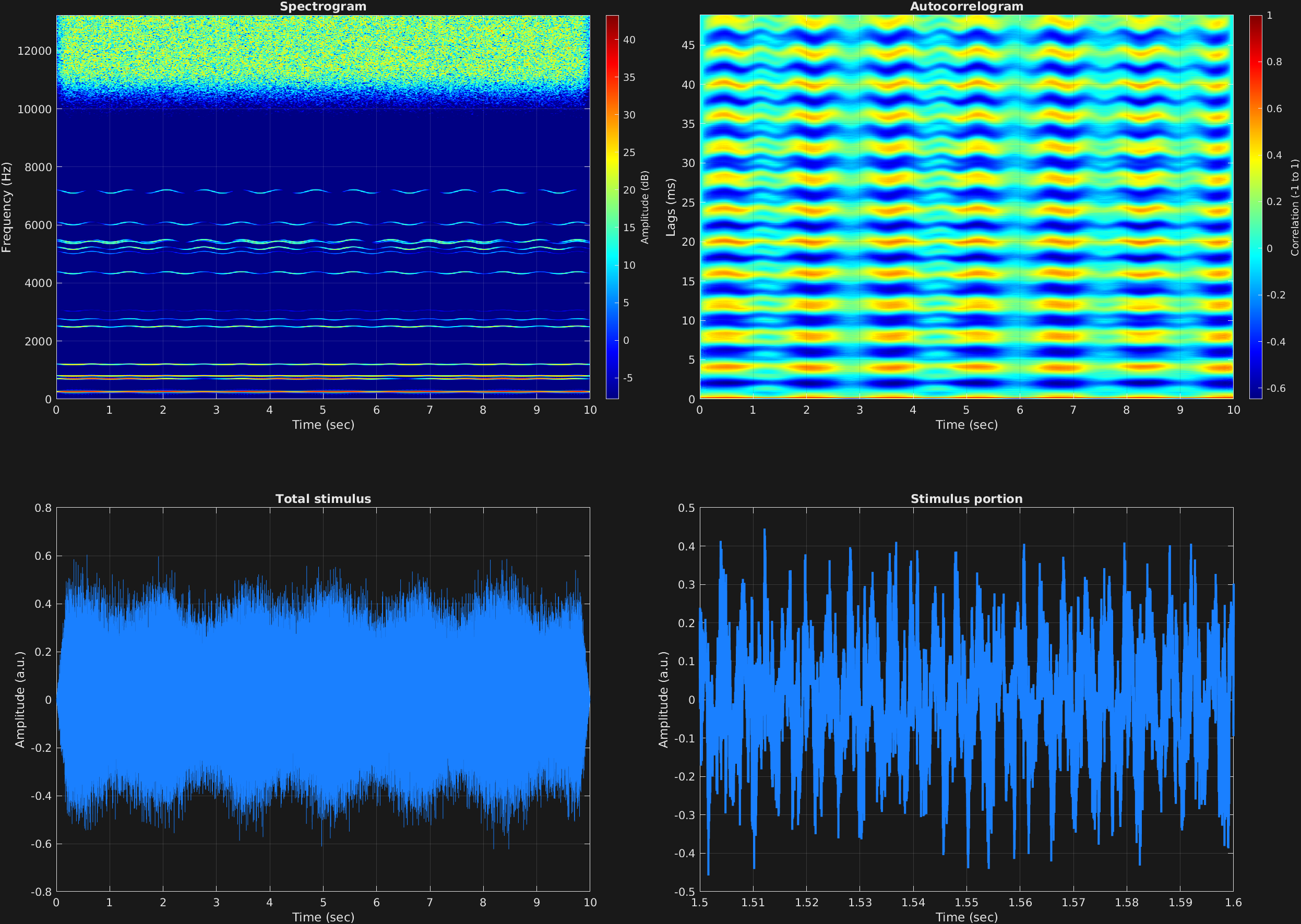Karl D. Lerud, Ph.D.
Auditory perception: Stimulus design and analysis
Project maintained by lerud Hosted on GitHub Pages — Theme by mattgraham
Using several of the attributes that have been described together, combined with some random numbers, we can create interesting soundscapes. In these examples, several carrier frequencies, amplitude modulation, freqeuncy modulation, filtered carriers, and a filtered mask are all utilized. Since these are also randomized to a large extent, the result will not be the same if you run this code yourself.
% Some plotting parameters
colorRatio=.67;
NFFT=8192*4;
specFreqPerc=[0 60];
specWindowLength=3000;
autoFreqPerc=[0 20];
xTimes=[1.5 1.6];
% Stimulus parameters
tSpans=[0 10];
fs=44100;
carWaves={'sin'};
rampTime=.2;
rampExp=1;
numHarm=20; % number of harmonics in complex
f0=50; % fundamental freq
factor=4; % factor by which to bias toward lower harmonics
work = zeros(1,numHarm);
for i = 1:numHarm
work(i) = randi(floor(fs/f0/2));
while ~isempty(find(work(1:i-1) == work(i), 1))
work(i) = randi(floor(fs/f0/2));
end
if mod(i,2) && work(i) > factor && isempty(find(work(1:i-1) == floor(work(i)/factor), 1))
work(i) = floor(work(i)/factor);
end
end
work = sort(work);
carFreqs = work*f0;
carAmps = zeros(size(carFreqs));
for i = 1:numHarm
carAmps(i) = rand/work(i);
end
carThs=0;
fmFreq = (rand+1);
fmAmp = rand/100;
amFreq = zeros(size(carFreqs));
for i = 1:numHarm
amFreq(i) = rand + .2;
end
amAmp = zeros(size(carFreqs));
for i = 1:numHarm
amAmp(i) = rand;
end
amCfreq=1;
[bs,as] = butter(randi([2 5]),rand/2);
aa = rand/2;
bb = rand/4;
[bm,am] = butter(randi([3 6]),[aa aa+bb]);
maskDb=rand*5;
% Create stimulus structure
s = stimulusMake(1, 'fcn', tSpans, fs, {'sin'}, carFreqs, carAmps, 'am', {'sin'},...
amFreq, amAmp, amCfreq, 'fm', {'cos'}, fmFreq, fmAmp, 'ramp', rampTime, rampExp, ...
'filtstim', {bs as}, 'mask', maskDb, 'filtmask', {bm am});
% Do some visualization
figure(1)
set(gcf,'position',[50 50 1700 1350])
subplot(2,2,1)
[~,~,cbar]=mdlSpec(s.x,NFFT,s.fs,specFreqPerc,specWindowLength);
grid on
temp=get(cbar,'limits');
colormap('jet')
totalRange=diff(temp);
cutoff=(colorRatio*totalRange)+temp(1);
caxis([cutoff temp(2)])
subplot(2,2,2)
mdlAutocorr(s.x,s.fs,autoFreqPerc);
grid on
subplot(2,2,3)
plot(s.t,s.x)
title('Total stimulus')
xlabel('Time (sec)')
ylabel('Amplitude (a.u.)')
grid on
zoom xon
subplot(2,2,4)
plot(s.t,s.x,'linewidth',2)
title('Stimulus portion')
xlabel('Time (sec)')
ylabel('Amplitude (a.u.)')
xlim(xTimes)
grid on
zoom xon
